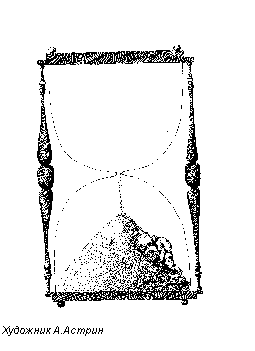Spring semester of 1997
Topic of the semester: TIME. EVOLUTION. LIFE. SOCIUM.
The Round Table. "PROBLEMS OF TIME AT THE CHANGE OF CENTURIES" Retrospective and forecasts. Presentation of the book "Time constructions in natural sciences. On the way to understanding the Time Phenomenon" (M.: Moscow University Press, 1996). General discussion.
Yu. V. CHAIKOVSKIY. "NEW TENDENCIES IN THE THEORY OF BIOLOGICAL EVOLUTION". The evolution conception as S. V. Meyen's variety transformations at last becomes popular in the scientists society. The main concent is S. V. Meyen's understanding of time. (Yu. V. Chaikovskiy. Variety Transformations. S. V. Meyen's evolution theory. // Chemistry and life. 1994. No. 1. Yu. V. Chaikovskiy. Elements of evolution diatropics. M.: Nauka. 1990)
A. P. RUDENKO. "SELF-ORGANIZATION AND PROGRESSIVE EVOLUTION IN NATURAL PROCESSES". When using the formalism of the quantitive theory of the existence, stability, self-organisation, self-developement and progressive evolution of elementary open catalytic systems and non equillibrium thermodynamics of operation processes, developed on the basis of the evolution catalysis theory, principles and laws general for chemical and biological evolution have been established in energy and kinematic formulations, which are valid in similar processes and in different conditions of matter developement. It is shown that there exist two types of self organization - continuous and ckherent: progressive evolution is due to changes in continuous self organization. (A. P. Rudenko. Self organization and progressive evolution in natural processes in view of the evolution catalysis conception. // Russian chemistry journal. 1995. T. 39. No. 2. Pp. 55-71).
V. L. VOEIKOV. "EVOLUTION AND DEVELOPMENT OF BIOLOGICAL SYSTEMS AS MACROKINETICS OF RAMIFIED CHAIN PROCESSES". Most essential in the life cycle (evolution) of all living systems is the stage of developement, when its organization level is increased, i.e. "the increase of differentiation degrees of parts of a single organism, the completeness of physiological labour division." (K. fon Ber). Usually processes of developement of living systems of different organisation levels (the dynamics of microorganism colonies, embryol and post-embryol developement of multicell organisms, the succession phenomenon, biosphere evolution) are viewed separately, although a set of scientists noticed significant similarities in their dynamic properties (K. fon Ber, V. I. Vernadsky, E. Bauer). The laws guiding ramified chain processes in chemical and physical systems are similar to those which are characteristic of biological developement. Experimental research of the dynamics of the self organization processes initiated in protobiochemical, cellular and multicellular systems indicates that such phenomenon as high reacivity of living systems in effect to energetically light external influences, combined with the stability of developing living systems to non extreme external influences, the oscillatory behavior of most life activity processes, the dependency of the actual state of a living system upon its pre-history at that time - can be analysed taking in consideration the macrokinetic laws of ramified chain processes (I. V. Baskakov, V. L. Voeikov. The role of electronical states in biochemical processes // Biochemistry. 1996. No. 7. V. L. Voeikov. Vitalism and biology: on the threshold of the 21st century. // Znanie-sila. 1996. No. 4. Pp. 46-57. L. V. Belousov, V. L. Voeikov, F. A. Popp. Gurvich's mytogene rays: a dramatic story and new perspectives. // Priroda. 1997. No. 3.).
A. A. ZOTIN. "BIOLOGICAL TIME AS A THERMODYNAMIC FUNCTION". The duration of every organism developement period stated in terms of astronomic time units, is a variable which depends upon external conditions. Therefore the problem the biologists had to tackle was finding a unit of biological time, which could be compared in one animal population in different conditions, and in different populations. At this time such a unit is the quotient of some indices to their values at some stage of developement (for instance, the quotient of mass to the maximum mass). All such criteria are interchangable, but most of them have a limited area of application. The most universal criteria is the quotient of the organism's specific heat production to it's asymptotic value. The organism's heat production value can be, in its turn, viewed as a characteristic of the specific dissipation function used in unequillibrium thermodynamics of open systems. Such a relative index is actually a measure of a system's remoteness from a final stationary state and can be viewed not as time, but age of the system. Biological time, it seems, can be viewed as an integral of this quotient of astronomical time. Some important results follow from such a determantion. They are discussed in the report. A possibility of such a determination of time for all open thermodynamic systems is dicussed.
V. S. VASILYEV. "THE ROLE OF THE TIME FACTOR IN MODERN SOCIAL-ECONOMIC PROCESSES". Problems concerning civilization processes which reflect macrocosmic laws of Time movement will be discussed. Analysis is made in the form of comparison between the time factor dynamics in american and russian civilazations. (V. S. Vasilyev. The time factor in social processes // USA: economics, politics, ideology.1993. No. 9. Pp.45-53. V. S. Vasilyev. In a time trap. Russian reality and G. Baker's theory // USA: economics, politics, ideology. 1996. No. 4. Pp. 15-27).
M. M. KRYUKOV. "SPACE-TIME STRUCTURE OF BUSINESS GAMES". Business games are the most "chronotropic" variation of social-economic models, because they transform the space-time structure of the modelled reality into a new chronotrope, special for every game class. All game events are evolved in this chronotrope. It contains all information on this game. The report is dedicated to studies of of the chronotrope structure of business games and various interconnections between the chronotrope and the game's contents. (M. M. Krukov, L. I. Krukova. The principles of reflecting the economic reality in business games. M: Nauka. 1988).
B. B. RADOMAN. "SEASONS AND RHYTHMS OF MY LIFE". My year can be divided into nine seasons, depending on the prevalence of some interests and doings. The corresponding life tone graph shows a series of well defined jumps.




